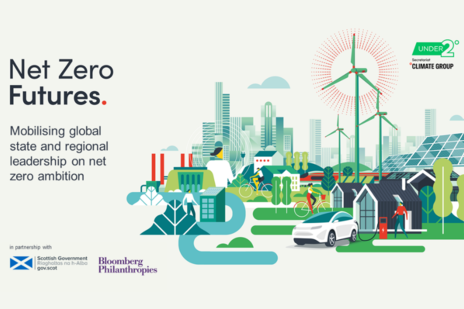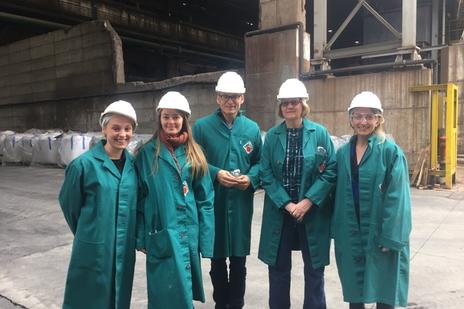
Net Zero Futures
Net Zero Futures was an initiative led by the Scottish Government, in partnership with Bloomberg Philanthropies and Climate Group, aimed at increasing action toward net zero emissions in states and regions worldwide.

Green Recovery
The benefits of a more sustainable recovery are unquestionable: providing long-term economic benefits, boosting employment, setting the world on a low-carbon path, increasing resilience, and creating a healthier and more just world.
We worked with leading states and regions to support a comprehensive and systemic transformation towards a safer, more prosperous and just world for all.
We brought together states and regions to showcase their success stories and share their best practices and lessons learnt to inspire further action at all levels of government and promote the benefits of a sustainable recovery.
Publications and resources
Reports
Building back greener - How states and regions are building a more sustainable, resilient post-pandemic future
Case studies
California - Raising ZEV ambition and streamlining the infrastructure permitting process
Catalonia - Expanding the carbon tax program
Chungnam - The Chungnam Green New Deal
Emilia-Romagna - Working with government & the public to deliver a new Climate Pact
Massachusetts - The 'Massachusetts Offers Rebates for Electric Vehicles' program
Navarra - The Reactivating Navarra Plan: accelerating environmental transition
Nevada - Clean Cars Nevada initiative
New York State - Accelerated Renewable Energy Growth and Community Benefit Act
New South Wales - Electricity infrastructure roadmap
North Rhine-Westphalia - Progres.NRW initiative
Québec - Plan for a Green Economy
Queensland - Renewable energy zones
Rhode Island - Advancing a 100% renewable future for Rhode Island by 2030
Scotland - A comprehensive green recovery
Scotland - Climate Change Plan: a path to green recovery
Victoria - Household Energy Saving Package
Yucatán - Urban Mobility Plan
Useful resources
C40 - The Case for a Green and Just Recovery
CarbonBrief - Coronavirus: Tracking how the world’s ‘green recovery’ plans aim to cut emissions
IMF - Green Recovery
New Climate Institute and Climate Analytics - A government roadmap for addressing the climate and post COVID-19 economic crises
OECD - Focus on green recovery
World Bank – Planning for the economic recovery from COVID-19: A sustainability checklist for policymakers
WRI – COVID-19 Resources Center, Building Back Better
Green Growth Knowledge Platform - Green Recovery for Practitioners: Setting the Course Towards a Sustainable, Inclusive and Resilient Transformation

Industry Transition Platform
The Industry Transition Platform worked with governments from highly-industrialised regions to develop strategies to cut industry emissions while supporting growth, job creation and prosperity.
During the project, state and regional governments worked together in groups to identify the key challenges they face in transitioning their industry to be low carbon.
Representatives from industry, system change experts and researchers provided participants with tailored technical support so that governments could develop impactful, innovative and ambitious industry emission reduction strategies.
The Industry Transition Platform was a joint project of the Climate Group and the German state government of North Rhine-Westphalia, funded by Stiftung Mercator.

Energy Transition Platform
The Energy Transition Platform supported state and regional governments to develop and implement innovative clean energy policies.
The Climate Group, alongside the initiative’s lead government, North Rhine-Westphalia, and Stiftung Mercator launched the Energy Transition Platform in early 2016. The project concluded in May 2018.
The platform connected 11 highly industrialised, carbon-intensive states and regions to share transition experiences and successful initiatives; supporting them to overcome barriers, and enabling the transfer and adoption of innovative clean energy policies.
Publications
Energy Transition Platform identified innovative policies that have the potential to accelerate the global clean energy transition.
Case studies

Zero Emission Vehicle Project
The Under2 Zero Emission Vehicle (ZEV) Project supported state and regional governments to increase the number of zero emission vehicles on their roads.
It offered participants the opportunity to network with other subnational leaders, share experience and identify innovative policies to accelerate the uptake of zero emission transport.
Ahead of the Global Climate Action Summit (GCAS) held in California during September 2018, governments in the Under2 Coalition vowed to step up ambition on clean transportation and this project gave them the platform to drive this commitment forward.
Publications
The Zero Emission Vehicle Project identified innovative policies implemented by Under2 Coalition members to accelerate the uptake of ZEVs.